#JNU scholars
Explore tagged Tumblr posts
Text
[ad_1] The Springer Nature India Research Tour 2024 was successfully concluded at Vellore Institute of Technology (VIT), Vellore, after an engaging journey across 9 states and 15 cities and 24 leading academic and research institutions, connecting with researchers. This ambitious initiative, flagged off by Prof. Dhananjay Singh, Member Secretary, ICSSR, in Delhi, sought to bridge academic ecosystems across India, fostering discussions on open access, research integrity, and India's future as a global research leader.Venkatesh Sarvasiddhi, MD, Springer Nature India presenting a token of appreciation to Dr. G Viswanathan, Founder and Chancellor, VIT Vellore at the India Research Tour 2024The tour featured interactions with both early-stage and experienced researchers from a wide range of government and private institutions, including IIMs, JNU, BITS Pilani, and various ICSSR-affiliated institutions. The tour also recognized 100 women researchers who have done exemplary work in their areas of research. A major highlight was the launch of the Cureus Journal of Business and Economics, a fully open-access journal, at Tata Institute of Social Sciences (TISS), Mumbai, marking an important step in expanding India's contribution to open-access publishing.Speaking on the successful completion of the tour, Venkatesh Sarvasiddhi, Managing Director of Springer Nature India, said, "The India Research Tour 2024 provided us with a unique opportunity to interact directly with India's brightest researchers and thought leaders. We've gained invaluable insights into the needs, challenges, and aspirations of the research community across regions. The discussions underscored the importance of open access and research integrity in accelerating both individual careers and national progress. Moving forward, we will use this feedback to shape future programmes and partnerships, enabling Indian researchers to thrive on the global stage."Prof. Dhananjay Singh, Member Secretary, ICSSR, expressed his thoughts on the collaboration, "We are pleased to have partnered with Springer Nature for the India Research Tour 2024. The tour fostered a dynamic exchange of ideas and has helped in sensitizing researchers to the evolving paradigms in publishing, especially in social science. I believe that this collaboration marks an important step in aligning institutional research efforts with global standards, thereby making Indian research more accessible and impactful worldwide."Dr. G Viswanathan, Founder and Chancellor, VIT Vellore, also shared his thoughts on hosting the final event, "We are honoured that VIT had the opportunity to host the concluding session of the Springer Nature India Research Tour 2024. This initiative has been instrumental in building awareness around open access and research integrity among our academic community. We look forward to future collaborations with Springer Nature that will further enhance the research ecosystem at VIT and beyond."The Springer Nature India Research Tour 2024 exemplifies the organization's commitment to promoting transparency, accessibility, and collaboration in research. By engaging directly with scholars and academic institutions across the country, Springer Nature is helping pave the way for India to emerge as a global leader in research and innovation.About Springer Nature For over 180 years Springer Nature has been advancing discovery by providing the best possible service to the whole research community. We help researchers uncover new ideas, support librarians and institutions with innovations in technology and data and provide quality publishing support to societies. We make sure all the research we publish is significant, robust and stands up to objective scrutiny, that it reaches all relevant audiences in the best possible format, and can be discovered, accessed, used, re-used and shared.As a research publisher, Springer Nature is home to trusted brands including Springer, Nature Portfolio, BMC, Palgrave Macmillan and Scientific American.
Springer Nature is also a leading educational and professional publisher, providing quality content through a range of innovative platforms, products and services. Every day, around the globe, our imprints, books, journals and resources reach millions of people. [ad_2] Source link
0 notes
Text
[ad_1] The Springer Nature India Research Tour 2024 was successfully concluded at Vellore Institute of Technology (VIT), Vellore, after an engaging journey across 9 states and 15 cities and 24 leading academic and research institutions, connecting with researchers. This ambitious initiative, flagged off by Prof. Dhananjay Singh, Member Secretary, ICSSR, in Delhi, sought to bridge academic ecosystems across India, fostering discussions on open access, research integrity, and India's future as a global research leader.Venkatesh Sarvasiddhi, MD, Springer Nature India presenting a token of appreciation to Dr. G Viswanathan, Founder and Chancellor, VIT Vellore at the India Research Tour 2024The tour featured interactions with both early-stage and experienced researchers from a wide range of government and private institutions, including IIMs, JNU, BITS Pilani, and various ICSSR-affiliated institutions. The tour also recognized 100 women researchers who have done exemplary work in their areas of research. A major highlight was the launch of the Cureus Journal of Business and Economics, a fully open-access journal, at Tata Institute of Social Sciences (TISS), Mumbai, marking an important step in expanding India's contribution to open-access publishing.Speaking on the successful completion of the tour, Venkatesh Sarvasiddhi, Managing Director of Springer Nature India, said, "The India Research Tour 2024 provided us with a unique opportunity to interact directly with India's brightest researchers and thought leaders. We've gained invaluable insights into the needs, challenges, and aspirations of the research community across regions. The discussions underscored the importance of open access and research integrity in accelerating both individual careers and national progress. Moving forward, we will use this feedback to shape future programmes and partnerships, enabling Indian researchers to thrive on the global stage."Prof. Dhananjay Singh, Member Secretary, ICSSR, expressed his thoughts on the collaboration, "We are pleased to have partnered with Springer Nature for the India Research Tour 2024. The tour fostered a dynamic exchange of ideas and has helped in sensitizing researchers to the evolving paradigms in publishing, especially in social science. I believe that this collaboration marks an important step in aligning institutional research efforts with global standards, thereby making Indian research more accessible and impactful worldwide."Dr. G Viswanathan, Founder and Chancellor, VIT Vellore, also shared his thoughts on hosting the final event, "We are honoured that VIT had the opportunity to host the concluding session of the Springer Nature India Research Tour 2024. This initiative has been instrumental in building awareness around open access and research integrity among our academic community. We look forward to future collaborations with Springer Nature that will further enhance the research ecosystem at VIT and beyond."The Springer Nature India Research Tour 2024 exemplifies the organization's commitment to promoting transparency, accessibility, and collaboration in research. By engaging directly with scholars and academic institutions across the country, Springer Nature is helping pave the way for India to emerge as a global leader in research and innovation.About Springer Nature For over 180 years Springer Nature has been advancing discovery by providing the best possible service to the whole research community. We help researchers uncover new ideas, support librarians and institutions with innovations in technology and data and provide quality publishing support to societies. We make sure all the research we publish is significant, robust and stands up to objective scrutiny, that it reaches all relevant audiences in the best possible format, and can be discovered, accessed, used, re-used and shared.As a research publisher, Springer Nature is home to trusted brands including Springer, Nature Portfolio, BMC, Palgrave Macmillan and Scientific American.
Springer Nature is also a leading educational and professional publisher, providing quality content through a range of innovative platforms, products and services. Every day, around the globe, our imprints, books, journals and resources reach millions of people. [ad_2] Source link
0 notes
Text
Central University Libraries in Delhi
1. Jawaharlal Nehru University Library: A Hub of Knowledge and Research.
The Jawaharlal Nehru University (JNU) Library, officially known as the Dr. B.R. Ambedkar Central Library, is one of the premier academic libraries in India. Established in 1969, the library is a central component of JNU's intellectual infrastructure, providing essential academic and research support to students, faculty, and scholars.


Key Features of JNU Library:
1. Extensive Collection: The library houses a vast collection of over 800,000 volumes, including books, journals, research papers, theses, and reference materials across a wide array of subjects. It is particularly strong in social sciences, humanities, languages, international studies, and sciences.2.
Digital Resources: The library offers access to numerous
online databases, e-journals, and e-books from international publishers, enabling students and researchers to stay updated with global developments in their fields. JNU is also a part of the UGC-INFONET Digital Library Consortium, providing access to various scholarly resources.3.
Specialized Collections: The library is home to a number of
special collections, including rare manuscripts, government publications, and research reports. It also holds significant archival material relevant to political science, economics, and international relations.4.
Research Support: The library offers comprehensive research support services, including
literature searches, citation management tools, and research guides to assist scholars. The dedicated reading rooms and quiet zones provide an ideal environment for in-depth research.5.
State-of-the-Art Infrastructure: With its fully air-conditioned and modernized reading rooms,
24/7 reading facility, and Wi-Fi-enabled campus, the library ensures that students and researchers have access to both physical and digital resources around the clock.6.
Innovative Services: JNU Library actively adopts new technologies, including
Remote Access Services, allowing users to access resources off-campus. The
RFID system for book borrowing and return has enhanced efficiency and user convenience.
2. Delhi University Central Library: A Pillar of Academic Excellence.
The Delhi University Central Library, often referred to as the Central Library of DU, is one of the most prestigious academic libraries in India. Established in 1922, the library has grown alongside the university, becoming an essential resource for Delhi University’s vast student body and faculty. It plays a crucial role in supporting the academic and research endeavors of one of India's largest and most renowned universities.
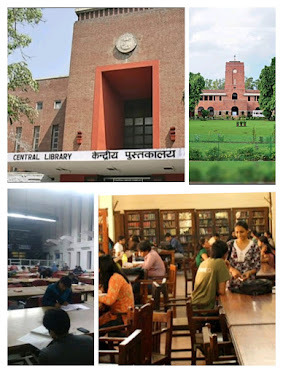

Key Features of DU Central Library:
Extensive Collection:The DU Central Library houses a comprehensive collection of over 1.6 million volumes, including books, journals, research papers, dissertations, and reference materials. Its vast collection spans a wide range of subjects, including humanities, social sciences, law, commerce, and sciences, providing students and researchers with invaluable academic resources.
Digital Resources:The library provides access to an extensive array of digital resources, including e-journals, e-books, and databases from leading global publishers like JSTOR, Springer, and Oxford University Press. DU is also part of the UGC-INFONET Digital Library Consortium, ensuring access to international research databases and academic journals.
Specialized Collections:The DU Central Library is home to numerous specialized collections, including rare books, government publications, and documents from the colonial and post-colonial periods. The library holds significant archival materials on Indian history, politics, and economics, making it a valuable resource for historians and researchers.
Research Support:The library offers extensive research support services, including literature searches, citation management tools, and research consultations. It also organizes research workshops to help scholars improve their research skills. Dedicated reading rooms provide a quiet environment conducive to deep research.
State-of-the-Art Infrastructure:The DU Central Library is equipped with modern infrastructure, including air-conditioned reading rooms, 24/7 study facilities, and high-speed internet access. The library provides both physical and electronic resources to ensure seamless access to information. Its spacious layout accommodates a large number of users, offering a comfortable environment for reading and research.
Innovative Services:The library leverages modern technology to enhance user experience, offering Remote Access Services that allow students and faculty to access digital resources off-campus. The introduction of an RFID-based system has made borrowing and returning books more efficient and user-friendly.
3. Jamia Millia Islamia Central Library: A Center of Knowledge and Learning
The Jamia Millia Islamia (JMI) Central Library, officially known as the Dr. Zakir Husain Library, is one of the most distinguished academic libraries in India. Established in 1920, it has evolved into a vital part of Jamia's academic framework, providing essential resources and services to support the educational and research activities of students, faculty, and scholars.


Key Features of JMI Central Library:
Extensive Collection:The Dr. Zakir Husain Library houses a vast collection of over 400,000 volumes, including books, journals, theses, dissertations, and reference materials. It covers a broad spectrum of academic disciplines, with notable strengths in social sciences, humanities, education, law, and Islamic studies.
Digital Resources:The library provides access to a wide array of digital resources, including e-journals, e-books, and online databases such as JSTOR, Wiley Online Library, and SpringerLink. It is also a part of the UGC-INFONET Digital Library Consortium, allowing users to access international academic publications and research resources.
Specialized Collections:The JMI Central Library is home to a number of special collections, including rare manuscripts, historical documents, and archives of national significance. The Maulana Mohammad Ali Jauhar collection is particularly noteworthy, containing valuable writings on India's independence movement and Islamic history.
Research Support:The library offers robust research support services, such as bibliographic assistance, citation management tools, and access to research guides. Dedicated reading areas and research rooms provide a conducive environment for focused academic work, supporting researchers across various disciplines.
State-of-the-Art Infrastructure:The Dr. Zakir Husain Library is equipped with modern infrastructure, including fully air-conditioned reading rooms, 24/7 access facilities, and Wi-Fi connectivity throughout the library. These features ensure that students and researchers have access to both physical and digital resources, enabling efficient learning and research.
Innovative Services:The library embraces technological advancements to improve user experience, offering Remote Access Services that allow users to access digital resources from anywhere. The implementation of an RFID-based system for book borrowing and returning has enhanced operational efficiency and user convenience.
4. Shri Lal Bahadur Shastri National Sanskrit University Central Library: A Repository of Sanskrit Knowledge.
The Shri Lal Bahadur Shastri National Sanskrit University (SLBSNSU) Central Library, also known as the Central Library of SLBSNSU, is a premier resource for Sanskrit education and research in India. Established with the aim of promoting the study of Sanskrit and ancient Indian knowledge, the library serves as a crucial pillar of the university’s academic framework, offering a wide range of materials to students, faculty, and researchers.
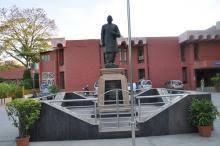

Key Features of SLBSNSU Central Library:
Extensive Collection: The library houses an impressive collection of over 100,000 volumes, focusing primarily on Sanskrit literature, Vedic texts, ancient Indian philosophy, and related disciplines. The collection includes books, journals, manuscripts, and reference materials that are essential for the study of Sanskrit and classical Indian knowledge systems.
Digital Resources: In addition to its vast physical collection, the library provides access to digital resources, including e-books, e-journals, and databases specific to Sanskrit and Indian philosophical traditions. The university is part of national consortia, ensuring access to valuable academic and research resources for Sanskrit scholars.
Specialized Collections: The SLBSNSU Central Library is home to several specialized collections of rare manuscripts, ancient texts, and commentaries on the Vedas, Upanishads, and other classical Indian scriptures. The library’s collection of rare Sanskrit manuscripts is particularly valuable for researchers in the field of Indology and Indian classical studies.
Research Support: The library offers dedicated research support services, including literature searches, access to rare manuscripts, and assistance in using specialized tools for Sanskrit research. The library is designed to provide a serene environment for in-depth study and reflection, with separate reading spaces for research scholars.
State-of-the-Art Infrastructure: The SLBSNSU Central Library is equipped with modern infrastructure, including air-conditioned reading rooms, digitization facilities for ancient manuscripts, and Wi-Fi-enabled access to online resources. These facilities ensure that both traditional and modern academic resources are easily accessible to the university community.
Innovative Services: The library offers Remote Access Services, allowing students and researchers to access digital resources from off-campus locations. Additionally, the library has implemented an RFID system for the efficient borrowing and return of books, enhancing the user experience and streamlining library operations.
5. South Asian University Central Library: A Hub of Regional Knowledge and Research.
The South Asian University (SAU) Central Library, established as a core component of SAU's academic infrastructure, is dedicated to supporting the educational and research pursuits of students, faculty, and scholars from across South Asia. As a vital resource for the university, which serves students from SAARC countries, the library plays a pivotal role in promoting regional cooperation and academic excellence.

Key Features of SAU Central Library:
Extensive Collection: The SAU Central Library houses a growing collection of over 50,000 volumes, including books, journals, research papers, and theses. The library's collections span multiple disciplines, with a particular emphasis on international relations, law, development economics, biotechnology, and computer science, making it a key resource for cross-disciplinary and regional research.
Digital Resources: The library offers access to an extensive range of digital resources, including e-journals, e-books, and databases from global publishers. These resources cover both regional and international scholarly materials, ensuring that students and researchers stay connected to the latest developments in their fields. SAU is also part of national and international digital consortia, facilitating access to high-quality academic resources.
Specialized Collections: The SAU Central Library holds a variety of specialized collections, including publications on South Asian history, politics, and economics, as well as key government reports and international treaties relevant to the SAARC region. These specialized materials make the library an essential resource for researchers focused on regional studies and policy analysis.
Research Support: The library provides extensive research support services, including assistance with literature reviews, citation management, and research methodologies. Dedicated research spaces and reading rooms offer a conducive environment for scholarly work, while library staff are on hand to provide guidance on navigating both physical and digital resources.
State-of-the-Art Infrastructure: The SAU Central Library is equipped with modern infrastructure, featuring air-conditioned reading rooms, 24/7 access facilities, and high-speed internet throughout the campus. These features ensure that students and researchers have seamless access to the information they need, whether through physical collections or digital platforms.
Innovative Services: The library embraces modern technological solutions to improve user experience, offering Remote Access Services that allow students and faculty to access resources from anywhere. Additionally, the library uses an RFID-based system for quick and efficient book borrowing and returning, enhancing operational efficiency and convenience for users.
6. Central Sanskrit University Central Library: A Beacon of Sanskrit Knowledge and Research.
The Central Sanskrit University (CSU) Central Library, formally known as the Library of Central Sanskrit University, stands as a premier resource dedicated to the study and research of Sanskrit and ancient Indian knowledge. Established in 1961, the library is a cornerstone of CSU’s academic infrastructure, offering essential support to students, scholars, and researchers in the field of Sanskrit and related disciplines.


Key Features of CSU Central Library:
Extensive Collection: The CSU Central Library boasts a rich collection of over 200,000 volumes, including books, manuscripts, journals, and reference materials. The library's collection is particularly renowned for its extensive holdings in Sanskrit literature, Vedic texts, classical Indian philosophy, and Indology, providing a comprehensive resource for scholars of ancient Indian traditions.
Digital Resources: The library provides access to a variety of digital resources, including e-books, e-journals, and online databases relevant to Sanskrit studies and classical Indian research. This includes access to international databases and digital collections that support research in ancient texts and Indian philosophy.
Specialized Collections: The CSU Central Library is home to several specialized collections, featuring rare manuscripts, ancient texts, and important commentaries on classical Sanskrit literature. Notable collections include manuscripts of ancient scriptures, Vedic hymns, and historical texts, making it an invaluable resource for researchers in Sanskrit and Indology.
Research Support: The library offers robust research support services, including assistance with literature searches, access to rare manuscripts, and guidance on research methodologies. The library also provides research workshops and seminars to support scholars in their academic pursuits. Dedicated reading areas offer a quiet and conducive environment for scholarly work.
State-of-the-Art Infrastructure: The CSU Central Library features modern infrastructure, including air-conditioned reading rooms, digital cataloging systems, and high-speed internet access. These facilities ensure that students and researchers can efficiently access both physical and digital resources in a comfortable and technologically advanced setting.
Innovative Services: The library embraces contemporary technologies to enhance user experience, offering Remote Access Services that allow users to access digital resources from anywhere. The implementation of an RFID-based system for book lending and returning has streamlined library operations and improved user convenience.
7. Indira Gandhi National Open University Central Library: A Beacon of Open Learning and Research.
The Indira Gandhi National Open University (IGNOU) Central Library is a vital resource for distance education and open learning in India. Established in 1985, the library plays a crucial role in supporting IGNOU’s mission to provide accessible and flexible education to students across the country and beyond. As a central hub for academic and research resources, it caters to the diverse needs of a large and varied student population.
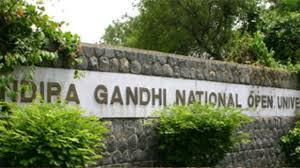

Key Features of IGNOU Central Library:
Extensive Collection:The IGNOU Central Library boasts a comprehensive collection of over 300,000 volumes, including books, journals, research papers, theses, and reference materials. The library's holdings cover a wide range of disciplines, with particular strengths in education, social sciences, humanities, management studies, and science and technology. This extensive collection supports both distance education and conventional academic research.
Digital Resources:The library provides access to a vast array of digital resources, including e-journals, e-books, and online databases. IGNOU is part of various digital consortia and national networks, such as the UGC-INFONET Digital Library Consortium, which ensures access to a wealth of international scholarly resources and up-to-date academic materials for its users.
Specialized Collections:The IGNOU Central Library features several specialized collections, including materials relevant to distance education methodologies, open learning resources, and educational technology. Additionally, the library holds theses and dissertations produced by IGNOU students, which are valuable for research and academic reference.
Research Support:The library offers a range of research support services, including literature searches, access to research guides, and assistance with citation management. With dedicated research rooms and study spaces, the library provides an environment conducive to focused academic work and research, supporting both distance learners and campus-based researchers.
State-of-the-Art Infrastructure:The IGNOU Central Library is equipped with modern infrastructure, including air-conditioned reading rooms, digital cataloging systems, and high-speed internet access. These features ensure that students and researchers have seamless access to physical and digital resources, enhancing the overall learning and research experience.
Innovative Services:The library actively incorporates innovative technologies to improve user access and convenience. This includes Remote Access Services, which allow users to access digital resources from anywhere, and an RFID-based system for efficient book borrowing and returning. The library also offers online reference services and virtual learning resources to support distance education.
HERE ARE SOME FAQs ON THE CENTRAL LIBRARIES OF DELHI UNIVERSITY.
1. Are these universities all located within Delhi?
Yes, all of these universities are located within the Delhi National Capital Territory (NCT).
2. What are the opening hours of these university libraries?
The opening hours may vary slightly between universities, but generally, they are open throughout the week, including weekends, with some variations during holidays. It's advisable to check the specific library's website or contact them directly for the most accurate timings.
3. Do these libraries have online catalogs or databases for searching books and resources?
Yes, most of these university libraries have online catalogs or databases that allow students, faculty, and researchers to search for books, journals, articles, and other resources. These databases often provide information about availability, location, and even digital copies of certain materials.
4. Are there restrictions on borrowing books from these libraries?
Yes, there are usually restrictions on borrowing books. The number of books that can be borrowed and the loan period may vary depending on the user's status (student, faculty, staff, etc.) and the type of material.
5. Do these libraries offer photocopying or scanning services?
Yes, most university libraries offer photocopying and scanning services at a nominal fee. There may be restrictions on certain materials, such as copyrighted works.
6. Are there facilities for group study or individual study rooms available in these libraries?
Many of these libraries have designated group study areas or individual study rooms that students can use for their academic work. These facilities often provide a quiet and conducive environment for focused study.
7. Do these libraries have internet access and computer facilities for students?
Yes, most university libraries provide computer labs with internet access for students. These facilities can be used for various academic purposes, such as research, writing, and accessing online resources.
8. Are there any specific guidelines or rules for using these libraries?
Yes, each library may have its own set of guidelines and rules that users must follow. These may include rules related to noise levels, food and drink, and the use of electronic devices.
9. Do these libraries offer any specialized collections or resources?
Yes, some libraries may have specialized collections or resources related to particular subjects or fields of study. For example, a university with a strong focus on law might have a specialized law library with extensive legal databases and collections.
10. Can visitors or non-affiliated individuals use these libraries?
The policy regarding access for visitors or non-affiliated individuals may vary between universities. Some libraries may allow visitors to use their facilities under certain conditions, while others may restrict access to students, faculty, and staff. It's best to check the specific library's policies or contact them directly for more information.
#https://jmi.ac.in/#https://www.jmi.ac.in/zhlibrary#IGNOU Central Library#CSU Central Library#Central Sanskrit University (CSU) Central Library#South Asian University (SAU) Central Library#Central Library of SLBSNSU#Delhi University Central Library#Dr. B.R. Ambedkar Central Library
0 notes
Text
Top University Dynamic landscape of Indian higher education
In the dynamic landscape of Indian higher education, a transformative wave has surged through the corridors of academia with the inception of the Common University Entrance Test (CUET-2024). Spearheaded by the visionary mandate of the National Education Policy (NEP-2020), CUET stands as a beacon of meritocracy, ushering in a new era of accessibility and opportunity for aspiring scholars nationwide.
0 notes
Text
🌟Registrations are Open for CSIR UGC NET JUNE 2024-2025 Batch.🌟
🌱Join Now Limited Seats. 🌱 Best NET CSIR Coaching Institute. Life Sciences coaching. 🌱CSIR NET life science coaching with a recorded video lecture, Live doubt clarification session, and study material. CSIR NET Life Sciences Coaching In Delhi.🌱 🌱It is a matter of immense pleasure to introduce ourselves as the leading institution for CSIR NTA NET JRF, SET, ICMR, ASRB, IIT-JAM, TIFR, GAT-B, GATE, and other PhD/M.sc Entrance Exam in like JNU, DU & BHU etc. The Mission of The Gyan Bindu Academy is to empower our youth from Life Science backgrounds to achieve their greatest potential both as scholars and as members of their 🌱🌱communities.🌱🌱 🌱CSIR-JRF-NET | ICMR (Life Sciences)🌱 🌱GATE | DBT (Biotech | Life Sciences)🌱 🌱M. Sc Entrance Exams (JNU | IISc)🌱 🌱FACILITIES AT GYAN BINDU ACADEMY🌱 🌱Printed Notes🌱 🌱Test Series🌱 🌱Distance Learning Program🌱 🌱Doubt Sessions🌱 🌱Periodic Performance Tests🌱 🌱Online Lectures🌱 🌱Classrooms🌱 🌱Counseling🌱 🌱Entrance Exam🌱 Enquiries: +91 9350172220/ 9560671566 Enquiries: [email protected]🌱 Follow us @gyanbinduacademy to know about the future of life sciences and its impact on our world. 🌱#csirnetlifesciences More - Information - https://csirnetlifescience.com/netlifescience/
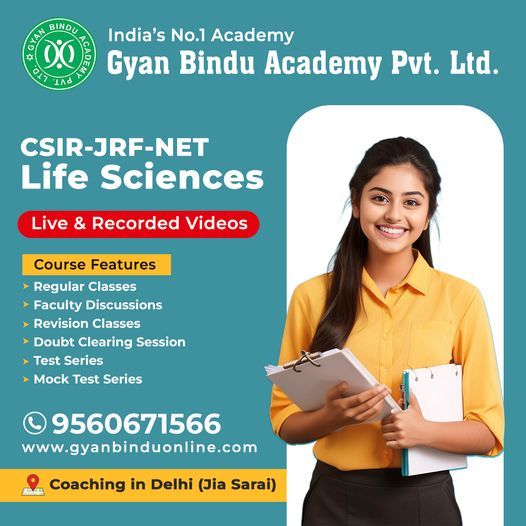
0 notes
Photo

Watch Conflict between ABVP-left wing college students in JNU: Declare- attacked with sharp weapon, water thrown on Scholar Union President - Hindi News Paper - Dainik Bhaskar
0 notes
Text

Send from Sansgreet Android App. Sanskrit greetings app from team @livesanskrit .
It's the first Android app for sending @sanskrit greetings. Download app from https://livesanskrit.com/sansgreet
Satya Vrat Shastri.
Satya Vrat Shastri (29 September 1930 – 14 November 2021) was an Indian Sanskrit scholar, writer, grammarian and poet. He wrote three Mahakavyas, three Khandakavyas, one Prabandhakavyas and one Patrakavya and five works in critical writing in Sanskrit. His important works are Ramakirtimahakavyam, Brahattaram Bharatam, Sribodhisattvacharitam, Vaidika Vyakarana, Sarmanyadesah Sutram Vibhati, and "Discovery of Sanskrit Treasures" in seven volumes.
#sansgreet #sanskritgreetings #greetingsinsanskrit #sanskritquotes #sanskritthoughts #emergingsanskrit #sanskrittrends #trendsinsanskrit #livesanskrit #sanskritlanguage #sanskritlove #sanskritdailyquotes #sanskritdailythoughts #sanskrit #samskrit #resanskrit #satyavratshastri #sanskritscholar #scholar #poet #indianpoet #punjabuniversity #banarashinduuniversity #jnu #sahitya #indianliterature #sanskritliterature #sahityaakademi #celebratingsanskrit #varanasi
#greetingsinsanskrit#sanskritgreetings#sanskrittrends#trendsinsanskrit#livesanskrit#sanskrit#celebratingsanskrit
0 notes
Text
The Cream of the Crop: Top 10 Best Universities in India
Introduction:
India is renowned for its rich cultural heritage, diverse landscapes, and a population that values education. Over the years, the country has invested heavily in higher education, leading to the establishment of numerous universities across its vast expanse. However, not all universities are created equal, and some stand out as beacons of academic excellence. In this article, we will explore the top 10 best universities in India, institutions that have consistently upheld the highest standards of education and research.
Indian Institute of Technology (IIT) Bombay:
IIT Bombay consistently ranks among the top engineering institutions in India and is recognized globally for its cutting-edge research and exceptional faculty.
Indian Institute of Science (IISc), Bangalore:
IISc, Bangalore is a hub for scientific research and is revered for its contributions to various fields, including aerospace, biotechnology, and computer science.
University of Delhi:
The University of Delhi has a rich history and offers a wide range of undergraduate and postgraduate programs, making it a top choice for students across the nation.
Jawaharlal Nehru University (JNU):
JNU is known for its strong emphasis on social sciences, humanities, and research. It's a nurturing ground for scholars and intellectuals.
Indian Institute of Technology (IIT) Delhi:
IIT Delhi boasts a strong engineering and technology curriculum and has consistently been at the forefront of innovation.
Tata Institute of Social Sciences (TISS):
TISS is renowned for its programs in social work, social sciences, and human resources management, making it a leader in the field of social sciences education.
Indian Institute of Management (IIM) Ahmedabad:
IIM Ahmedabad is a premier business school in India, producing top-notch management professionals who contribute to the corporate world.
Banaras Hindu University (BHU):
BHU is known for its strong emphasis on research and offers a diverse range of courses in fields like arts, science, and technology.
University of Calcutta:
Founded in 1857, the University of Calcutta has a rich history and has produced some of India's finest scholars, including Nobel laureate Amartya Sen.
Indian Statistical Institute (ISI), Kolkata:
ISI is a pioneering institution in the field of statistics and data science, and its graduates are in high demand in various industries.
For more info:-
NIRF Top 10 Universities in India 2023
Top 10 Government Universities in India
0 notes
Text
Unmasking the Mysterious Farooque Alam: Disabled PhD Scholar Reportedly Targeted in Brutal Assault by ABVP Activists at JNU
A senior activist of the National Students’ Union of India (NSUI), Farooque Alam, was reportedly attacked by members of the Akhil Bharatiya Vidyarthi Parishad (ABVP) at Jawaharlal Nehru University (JNU). The NSUI shared a post on social media, claiming that ABVP activists entered the Kaveri Hostel at the university and had a scuffle with Farooque. Farooque Alam is a National Spokesperson for the…

View On WordPress
0 notes
Text
Unmasking the Mysterious Farooque Alam: Disabled PhD Scholar Reportedly Targeted in Brutal Assault by ABVP Activists at JNU
A senior activist of the National Students’ Union of India (NSUI), Farooque Alam, was reportedly attacked by members of the Akhil Bharatiya Vidyarthi Parishad (ABVP) at Jawaharlal Nehru University (JNU). The NSUI shared a post on social media, claiming that ABVP activists entered the Kaveri Hostel at the university and had a scuffle with Farooque. Farooque Alam is a National Spokesperson for the…

View On WordPress
0 notes
Text
Unmasking the Mysterious Farooque Alam: Disabled PhD Scholar Reportedly Targeted in Brutal Assault by ABVP Activists at JNU
A senior activist of the National Students’ Union of India (NSUI), Farooque Alam, was reportedly attacked by members of the Akhil Bharatiya Vidyarthi Parishad (ABVP) at Jawaharlal Nehru University (JNU). The NSUI shared a post on social media, claiming that ABVP activists entered the Kaveri Hostel at the university and had a scuffle with Farooque. Farooque Alam is a National Spokesperson for the…

View On WordPress
0 notes
Text
JNU Conference, 3rd International Conference on Plasma Theory and Simulations (PTS 2023), JNU New Delhi, read full article
About JNU Conference PTS 2023 The JNU Conference “International Conference on Plasma Theory & Simulations (PTS)” is held every year as a unique opportunity for getting together the leading scientists, young researchers, and PhD scholars working in the various research areas of theoretical, computational and experimental plasma physics. The conference topics include novel numerical models,…

View On WordPress
0 notes
Photo
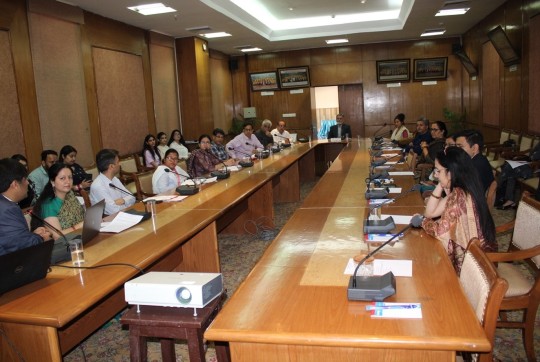
JKST&IC Sponsored Brainstorming on Still birth, Infant mortality and birth defects held at SMVDU
A one-day brain-storming meeting on "Still Birth, Congenital Malformations, and Infant Death among Newborns in Jammu and Kashmir Region" was conducted at Shri Mata Vaishno Devi University (SMVDU), Katra. The meeting was sponsored by J&K Science Technology and Innovation Council, Dept. of Science and Technology, Govt. of J&K, and was organized by the team of ICMR-CAR scientists and scholars led by Dr. Girish, Dr. Sonali, Ms. Minerva Mr. Rajeshwar, and Dr. Rakesh Kumar, the organizing secretary and principal coordinator of ICMR-CAR, SMVDU. The meeting addressed the crucial issues related to still birth, congenital malformations, and infants' death. Padma Shri Prof. RNK Bamezai, former Vice-Chancellor of SMVDU and Ex-Dean Life Sciences JNU, chaired the meeting, and representatives of most institutes of the UT of Jammu and Kashmir attended the meeting. Various experts shed light on different aspects of stillbirth and congenital anomalies prevalent in Jammu and Kashmir. Prof. Bamezai suggested identifying biomarkers for still birth, congenital malformations, and infants' death.
Representative of majority of the institutes of the UT of Jammu and Kashmir attended the meeting: Mrs. Sunita Razdan Dhar, Joint Director JKST&IC, Prof Ghansham Saini, Head Department of Paediatrics, GMC Jammu, Dr. Rakesh Raina PHC, Akhnoor, Dr Dinesh Kumar, Dean academics, AIIMS Jammu, Dr. Audesh Bhat, Central University of Jammu, Dr Javeed Iqbal Department Of Pediatric Respiratory Medicine (ERS) SKIMS, Dr. Renu Sharma, Dr Ritesh Kumar from AIIMS Jammu, Dr Anand Yelne Consultant Pediatrician, Dr. Sonia Nagyal Consultant Pathologist Dr. Arunima Consultant Gynae, Dr. Kamaljeet Kaur, Consultant Paediatrician, of SMVDNH, Katra, Dr Anindya Goswami and Dr Mohd. Jamal Dar Principal Scientists of CSIR-IIIM, Jammu, Mrs. Pushpa Oraon Associate Professor SMVDCON, Katra, Dr. Ruchi Shah from University of Kashmir, Dr. Ekta Rai from SMVDU threw light on different aspects of still birth and congenital anomalies prevalent in Jammu and Kashmir.Dr. Rakesh Kumar presented the vote of thanks to the participants and expressed his gratitude to Padma Shri RK Sinha, Vice-Chancellor, SMVDU, for his continuous support and motivation, and JK Science technology and innovation council for sponsoring such a critical area for brainstorming.
0 notes
Photo

With Guruji Prof. Sachidanand Sinha 🙏🏽 I have the longest association with Sachi sir as my teacher, mentor and guru. And as I grew older, I learned few personal traits from him as well. Not giving a fuc*!k is one of them. Thank you sir for being a saviour for many scholars like me, who had different ideology from the prevailing ideological hegemony in JNU. If we made it today, it is only because of you. 🙏🏽 #gratitude #supervisor #JNU (at Jawahar Lal Nehru University) https://www.instagram.com/p/Co81ut3v8d3/?igshid=NGJjMDIxMWI=
0 notes
Photo

Rishi Rajpopat( Brahman), an Indian scholar at #CambridgeUniversity solves a 2500 yrs old #Sanskrit #grammar Conundrum. P.S.- And #JNU Jholachaap wokes want #Brahmins to leave #Bharat since they can't match upto the brains even after the jack of Reservations. https://www.instagram.com/p/CmOj9sbPovv/?igshid=NGJjMDIxMWI=
0 notes
Text
Tum Chahiye by Priti Urvanshi

About the Book
This book describes the reality of society in a form of Shayari which we as humans face every day. It is a compilation of different Shayaries related to relationships, religion, love, depression, anxiety, life, etc. what she sees and experience in society she writes in words. If you are getting stuck in saying anything to any relation keep it as a guidebook. A good book to read. The language used is both Hindi-English.
About the Author
Priti Urvanshi is an author, painter, research scholar and Assistant Professor from Delhi. She has studied at DU and JNU. She is an avid reader of books. She has an education in Biology, History, Sociology, Fine Arts, African Studies and Creative Writing. She is also trained in Yoga, Meditation and acupressure/healing. She believes in peace, harmony, love and forgiveness.
Shop now from Amazon, Flipkart, and BlueRose Online.
0 notes